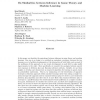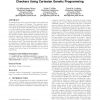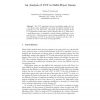533 search results - page 20 / 107 » Playing games with approximation algorithms |
ATAL
2005
Springer
14 years 2 months ago
2005
Springer
Reinforcement learning problems are commonly tackled with temporal difference methods, which use dynamic programming and statistical sampling to estimate the long-term value of ta...
JAIR
2008
13 years 9 months ago
2008
In this paper, we elucidate the equivalence between inference in game theory and machine learning. Our aim in so doing is to establish an equivalent vocabulary between the two dom...
GECCO
2008
Springer
13 years 10 months ago
2008
Springer
A developmental model of neural network is presented and evaluated in the game of Checkers. The network is developed using cartesian genetic programs (CGP) as genotypes. Two agent...
SODA
2010
ACM
14 years 6 months ago
2010
ACM
The class of constraint satisfactions problems (CSPs) captures many fundamental combinatorial optimization problems such as Max Cut, Max q-Cut, Unique Games, and Max k-Sat. Recent...
CG
2008
Springer
13 years 11 months ago
2008
Springer
The UCT algorithm has been exceedingly popular for Go, a two-player game, significantly increasing the playing strength of Go programs in a very short time. This paper provides an ...



